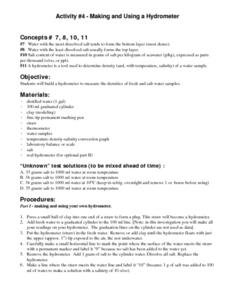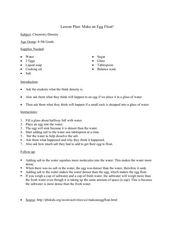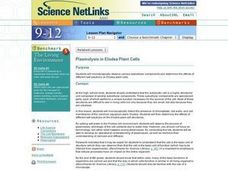Curated OER
A Funny Taste
Learners participate in a demonstration that illustrates the relative amounts of salt in various bodies of water including the Dead Sea, Sallt Lake, Ocean water and distilled water. They taste and compare various mixtures.
Curated OER
Making and Using a Hydrometer
Students build a hydrometer to measure the densities of fresh and salt water samples. They record the water temperature and density and use the temperature, density, and salinity conversion graph to locate the salinity. Finally,...
Curated OER
Sedimentary Rocks
In this sedimentary rocks instructional activity, students conduct an experiment where they observe a shallow dish of water and table salt. Then they determine what causes the salt to leave deposits in the pan. Students also describe...
Curated OER
Make An Egg Float!
Students analyze density. In this density lesson, students experiment with floating an egg. Students discover that salt added to water changes the density of the water allowing an egg to float.
Curated OER
Biocomplexity Lab Activity: Density and Buoyancy of
Students investigate how the density of water changes the buoyancy of
water. Students create a hypothesis about what will happen when placing the
egg into the water.Students can research online different bodies of water (The Red Sea, The...
Curated OER
Salt Water Wedge
Students conduct an experiment to observe the properties of both salt and freshwater. They explain why freshwater will stay at the surface while salt water will travel up a river bottom because of density. Students also research the...
Curated OER
Smoothing Out the Rough Spots
Fifth graders experiment to observe the changes created on a surface by mechanical action of water with varying amounts of mineral content and abrasive qualities. They write the predictions of their outcomes and describe all of their...
Curated OER
Displacement Reactions and Acid/Base Reactions
In this chemical reactions instructional activity, students review the solubility rules for common salts. Students determine the molecular equation, ionic equation, and net ionic equation for specific reactions. Students calculate moles...
Curated OER
The Floating Golf Ball
Students explore density by floating golf balls. They explore having their golf balls float halfway in a container of water and discuss density and its realtionship to where the golf balls are floating. After adding food coloring, they...
Curated OER
The Three E's - Exciting Energetic Electrons
Learners perform flame tests on salts and record the electron configurations for various cations. They analyze and record the results using spectroscopes.
Curated OER
8th Grade Earth Science: Density
Students draw upon their prior knowledge of the density of water and practice writing a hypothesis, making an observation, and analyzing data while watching a density demonstration.
Curated OER
Investigating Convection Currents
Students examine how differences in the temperature and salinity of the water help create ocean currents. They perform an experiment which shows how temperature affects the circulation of ocean water.
Curated OER
Homemade Ice Cream
Students investigate nutrition by creating ice cream in class. In this cooking lesson plan, students define the ingredients in ice cream and discuss how they form together to create a delicious treat. Students utilize salt, ice, milk and...
Curated OER
Plasmolysis in Elodea Plant Cells
Students microscopically observe various subcellular components. They determine the effects of different salt solutions on Elodea plant cells. Students explain the major function of a cell membrane and describe its structure.
Curated OER
San Ignacio Lagoon: Economy or Ecology
Students debate over the development in the habitat of gray whales. In this role playing lesson, students will take on various roles in a debate over the development of a salt production facility in the San Ignacio Lagoon concerning the...
Curated OER
Effects of the Southern Pacific Railroad Causeway
Fifth graders describe the appearance of a substance before and after a physical change. They re-create the Southern Pacific Railroad Causeway across the Great Salt Lake. They determine for themselves how the water is exchanged...
Curated OER
Melting Ice
Students observe the melting of ice and explore the basic physical changes that occur. They gain information of how different substances change the rate of melting. Students discuss the properties of water and ice, the definition of...
Curated OER
The First Farmers
Students show how constant irrigation, with repeated evaporation of water that left salts in the soil, eventually ruined much farming land in southern Mesopotamia. They discuss the idea that with the development of irrigation people...
Curated OER
Tongue Map
Students explore human anatomy by conducting a human senses experiment. In this taste lesson, students identify the main purpose of a tongue and how it enhances our eating habits. Students utilize baking coca, lemon juice, salt and honey...
Curated OER
Why Use Money? Getting What We Need
Students learn the difference between purchase, barter, and payment for service, then explore how the Akan and North African people used a barter system to exchange gold and salt. They identify the most efficient ways of procuring your...
Curated OER
Rusting and the Scientific Method
Pupils observe the oil can scene with the tin man from a clip from "The Wizard of Oz" and answer the question, "What can we learn about rust from this scene?". They take 2 tubes and 2 nails, adding 1 salt packet to 2 ml of distilled...
Curated OER
How Do You Dew?
Students examine how the processes of condensation and evaporation occur. They describe the relationship between heat energy, evaporation and condensation of water on Earth. They give examples of the processes of evaporation and...
Curated OER
Cleaning Pennies
Students observe changes in a penny when it is cleaned. In this scientific inquiry lesson, students use a dixie cup filled with vinegar and salt, and drop the penny into the water. Students observe the changes.
Curated OER
Nothing New? A Physical Change
Fifth graders discuss the differences between chemical and physical changes. In groups, they complete experiments and discover how a physical chnage can be reversed. To end the lesson, they review the steps of the water cycle and...

























